Salmon Cakes
- By Jennifer Segal
- Updated November 15, 2024
- 446 Comments
- Leave a Review

This post may contain affiliate links. Read my full disclosure policy.
Made with fresh salmon and seasoned with Old Bay, these salmon cakes are a delicious upgrade from the canned version you might remember—and they can be made entirely ahead of time.
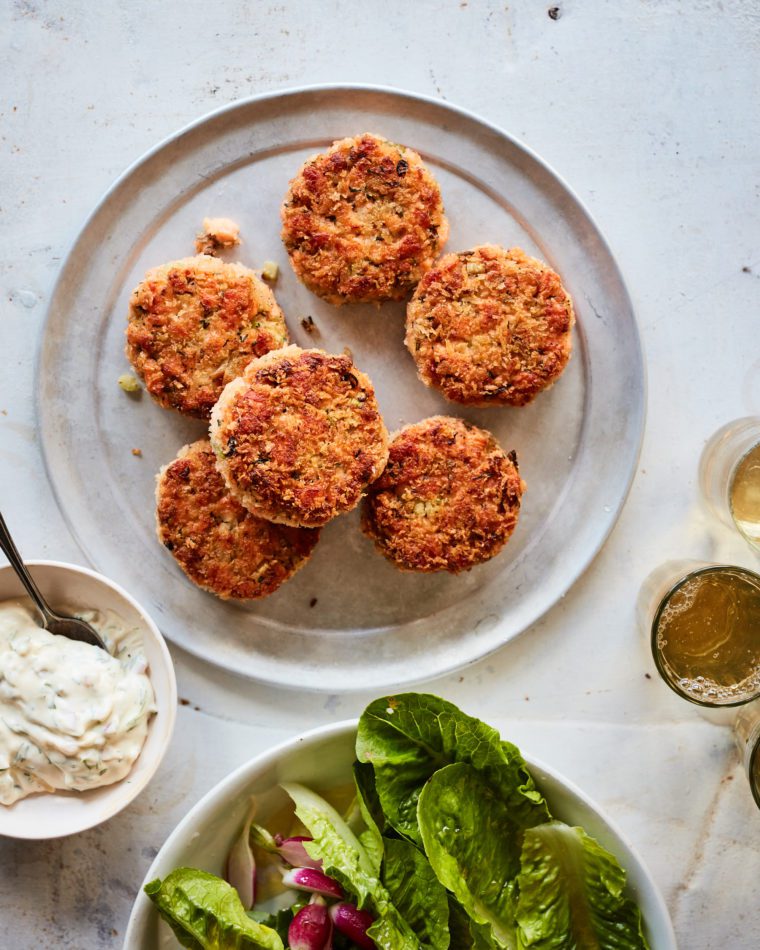
Photo by Johnny Miller (Clarkson Potter, 2021)
When I told my friend and Once Upon a Chef right hand, Betsy Goldstein, about these salmon cakes, she said, “Hmmm…I think I’ll wait until some of the reviews roll in to try those.” I laughed because I knew she was thinking of the version made from canned salmon that many of us grew up on. I promise: these are a whole different animal. Made from fresh raw salmon and seasoned with Old Bay, they’re as elegant and delicious as crab cakes—but far more budget-friendly. What’s more, they can be made entirely ahead of time and reheated.
I love these salmon cakes for brunch over a green salad with vinaigrette, but they also make a delicious dinner alongside rice pilaf and roasted asparagus. Either way, they are wonderful with tartar sauce on the side.
“Simply delicious and tastes like a fancy restaurant dish.”
What You’ll Need To Make Salmon Cakes
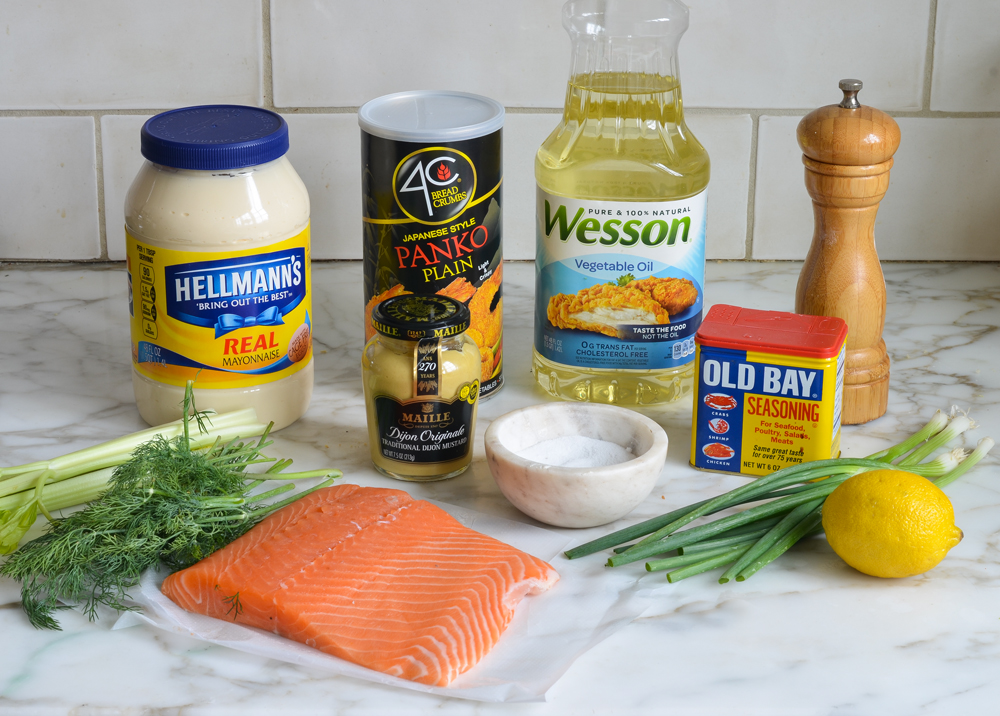
- Mayonnaise: Adds creaminess and helps bind the salmon cake mixture together. Always use a good-quality mayo, such as Hellmann’s or Duke’s.
- Fresh lemon juice: Provides a bright, tangy flavor that complements the salmon.
- Dijon mustard: Adds a subtle tang and depth of flavor.
- Old Bay seasoning: Enhances the savory flavor with a hint of spice.
- Salmon fillet: A rich, flavorful fish that forms the base of the cakes; always ask your fishmonger to remove the skin to make prep easier.
- Panko bread crumbs: Helps bind the mixture and creates a crisp exterior.
- Scallions: Add a mild onion flavor and a fresh pop of color.
- Celery: Provides crunch.
- Fresh dill: Adds a fragrant, herby note that pairs beautifully with salmon.
- Vegetable oil: Used for frying to create a golden, crispy crust on the cakes.
- Jump to the printable recipe for precise measurements
Step-by-Step Instructions
To begin, finely dice the salmon into 1/4-inch pieces (or smaller). It’s important that the pieces are not too large or the cakes won’t bind together easily.
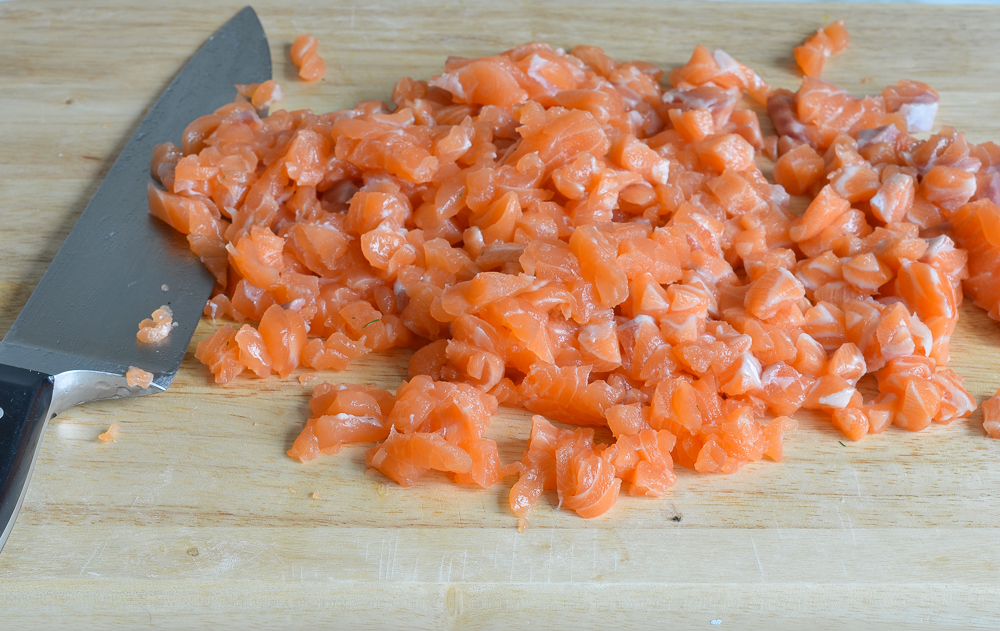
Set the salmon aside and, in a large bowl, combine the mayonnaise, lemon juice, mustard, Old Bay, salt, and pepper.
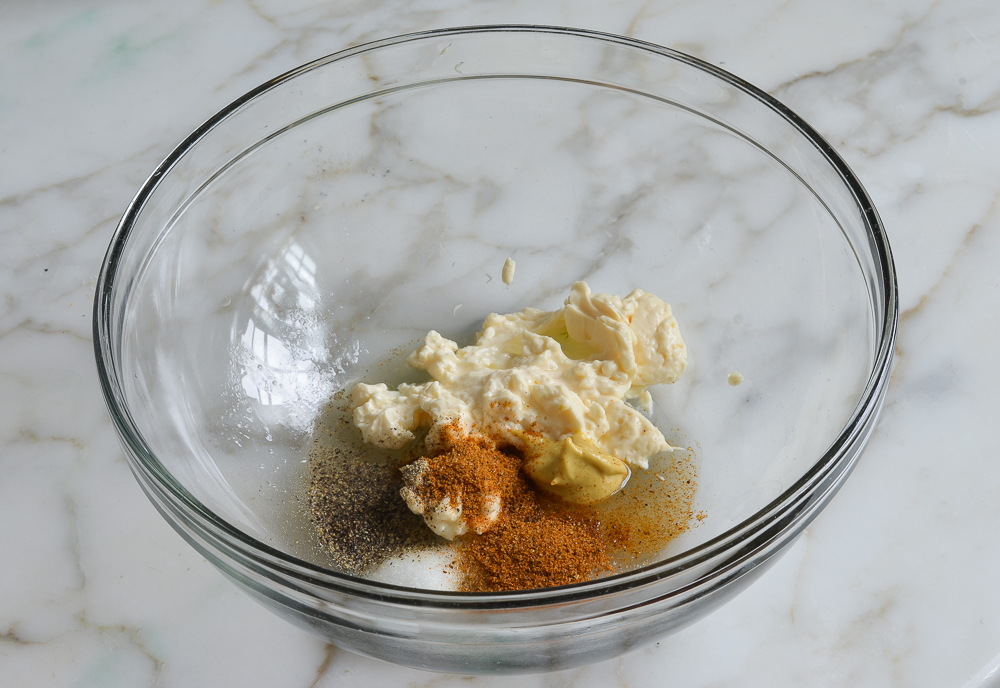
Whisk to combine.
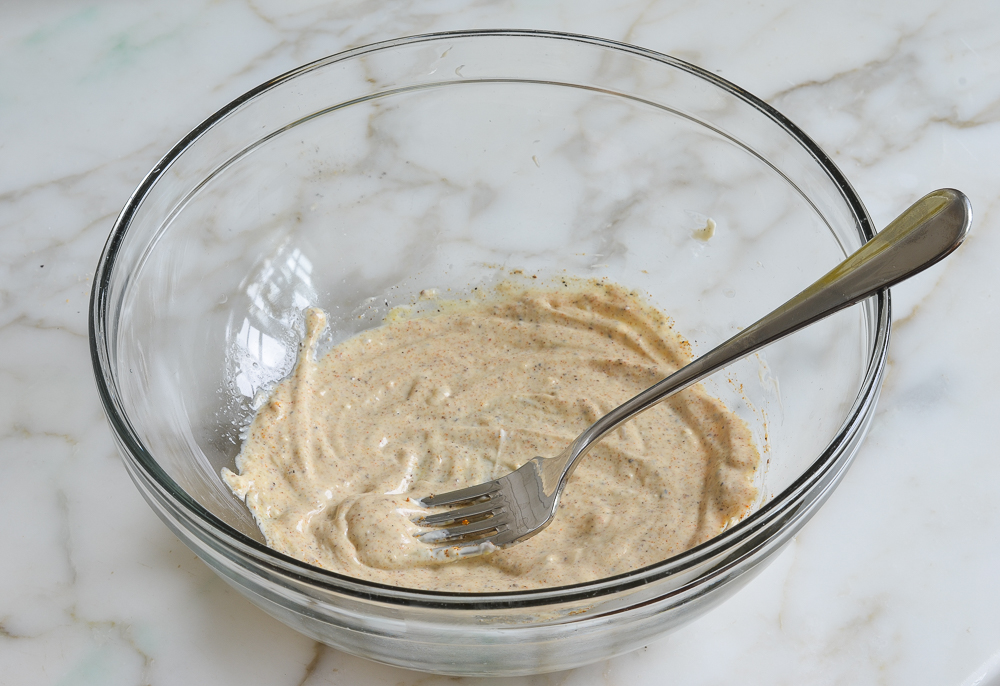
Add the diced salmon, ¼ cup of the panko, the scallions, the celery, and the dill.
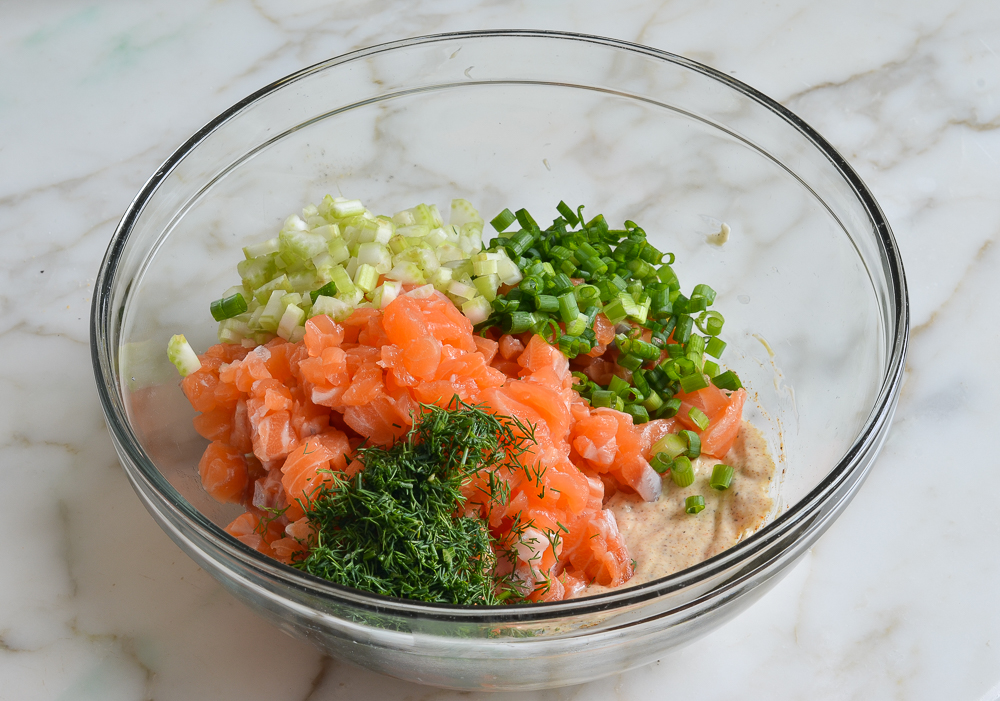
Gently mix until uniformly combined.
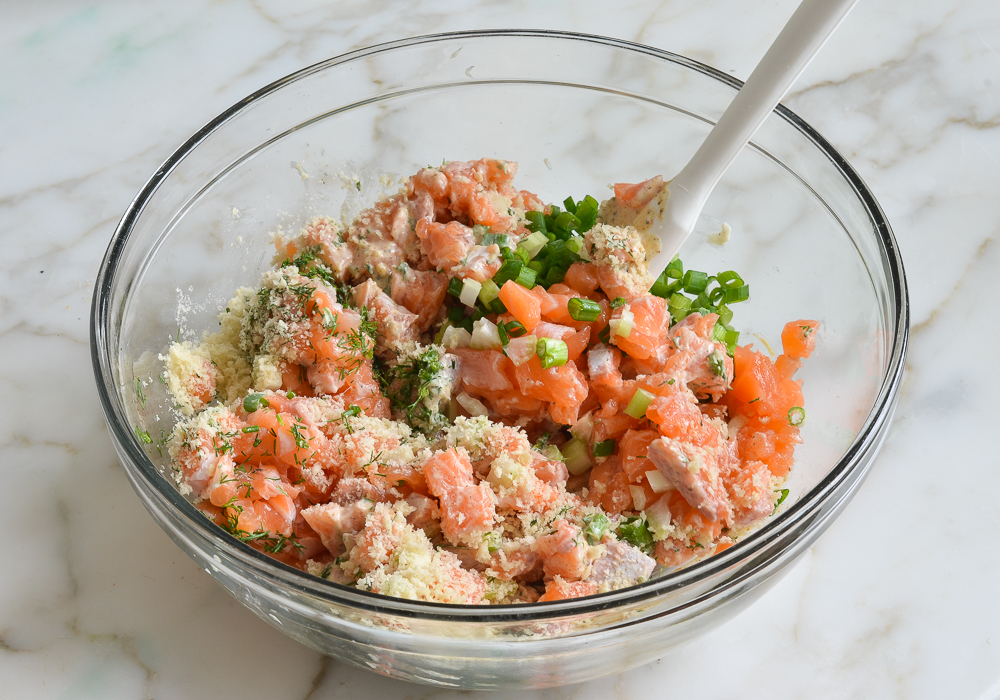
Place the remaining 1 cup of panko in a shallow dish or pie plate.
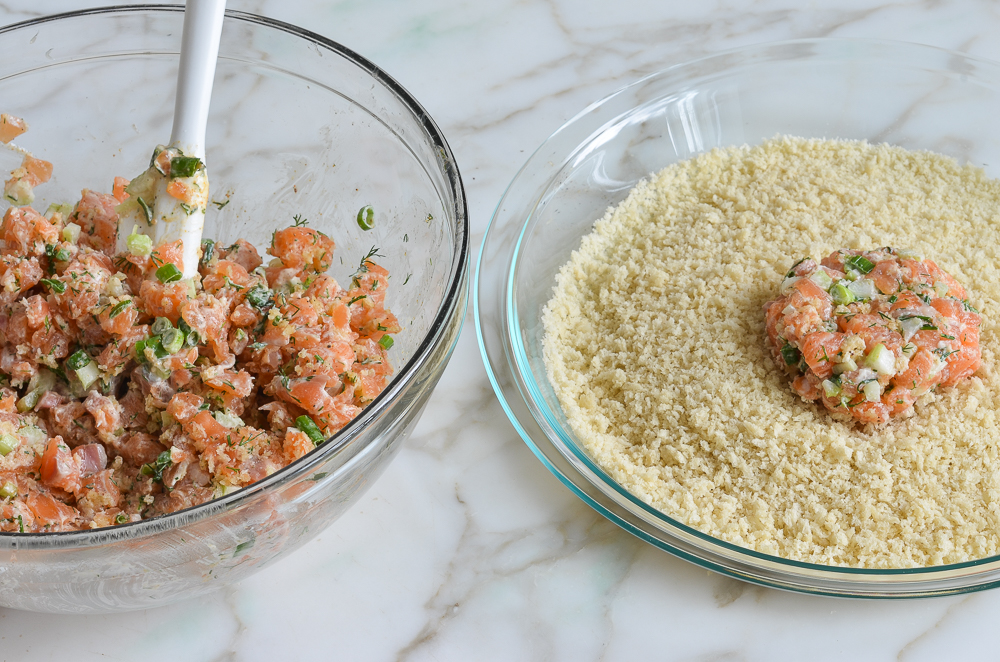
Using a 1/3-cup measure, scoop the salmon mixture and form into a compact cake about 1 inch high. Place the salmon cake into the reserved panko and gently coat it all over in crumbs.
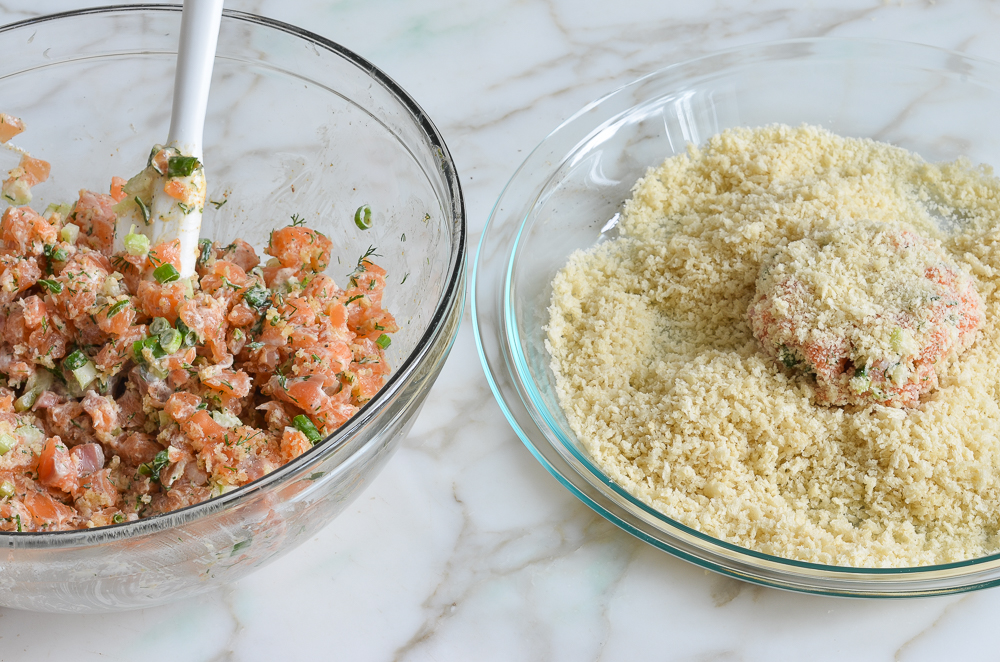
Repeat with the remaining mixture to form about 9 cakes. (At this point, you can refrigerate the cakes for up to a few hours before cooking, if you’d like.)
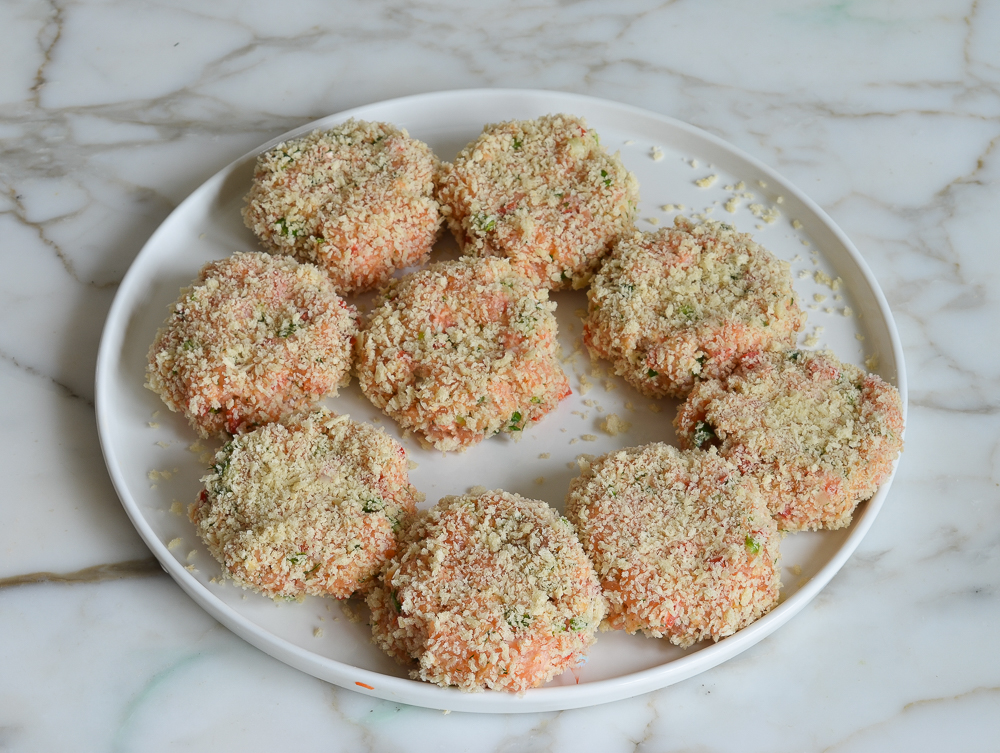
Heat the oil in a medium nonstick skillet over medium-high heat until shimmering. Place the salmon cakes in the skillet and cook without moving until golden brown, about 2 minutes.
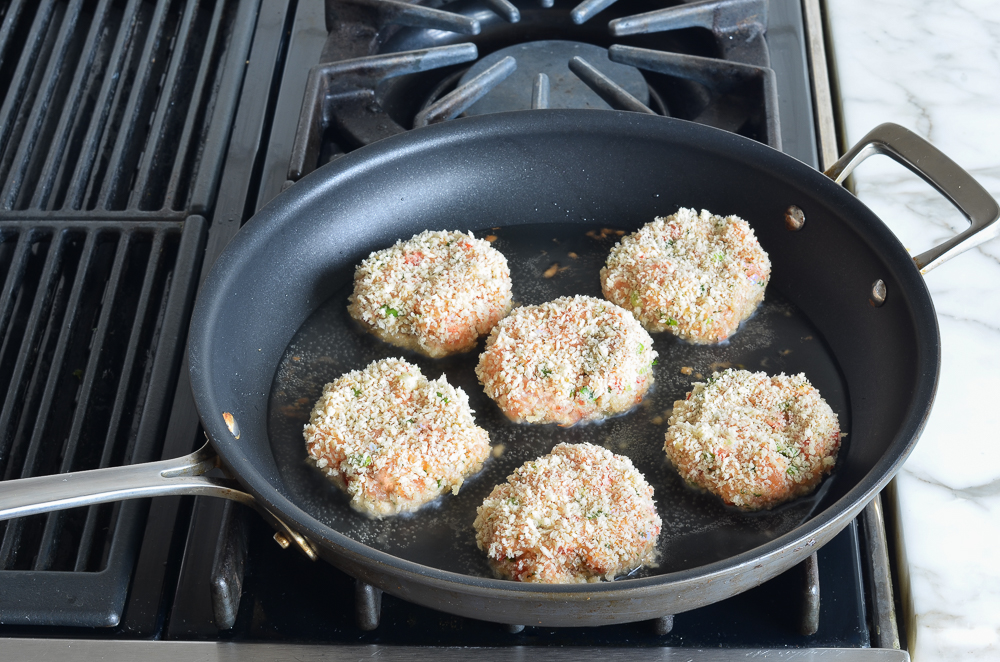
Carefully flip the cakes and cook until second side is golden brown, about 2 minutes more. Reduce the heat to medium if the cakes are browning too quickly.
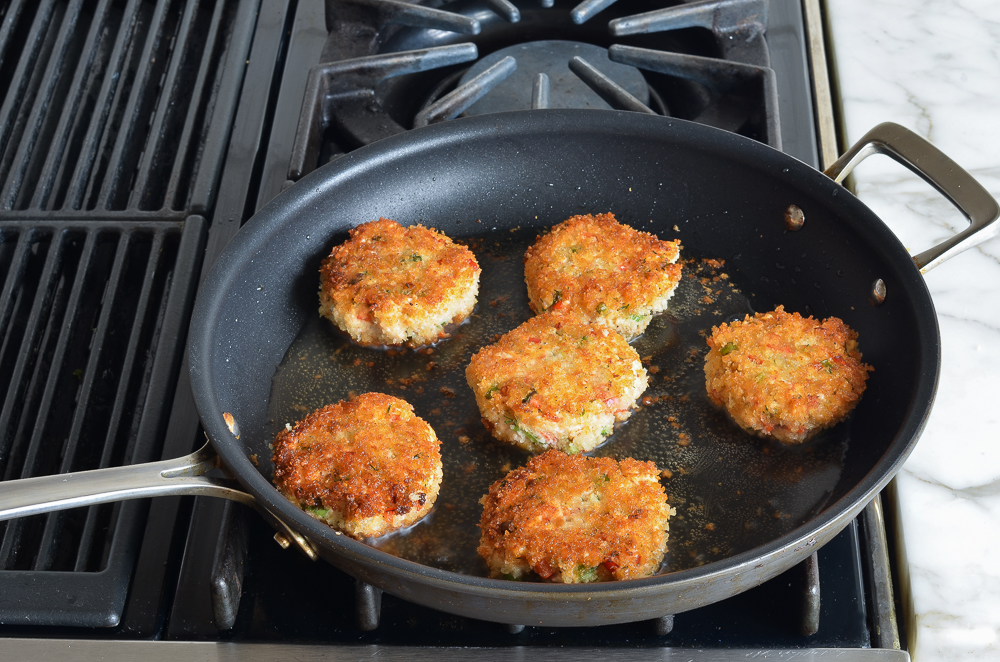
Transfer cakes to a paper towel–lined plate to drain. Repeat with the remaining cakes (no need to change the oil).
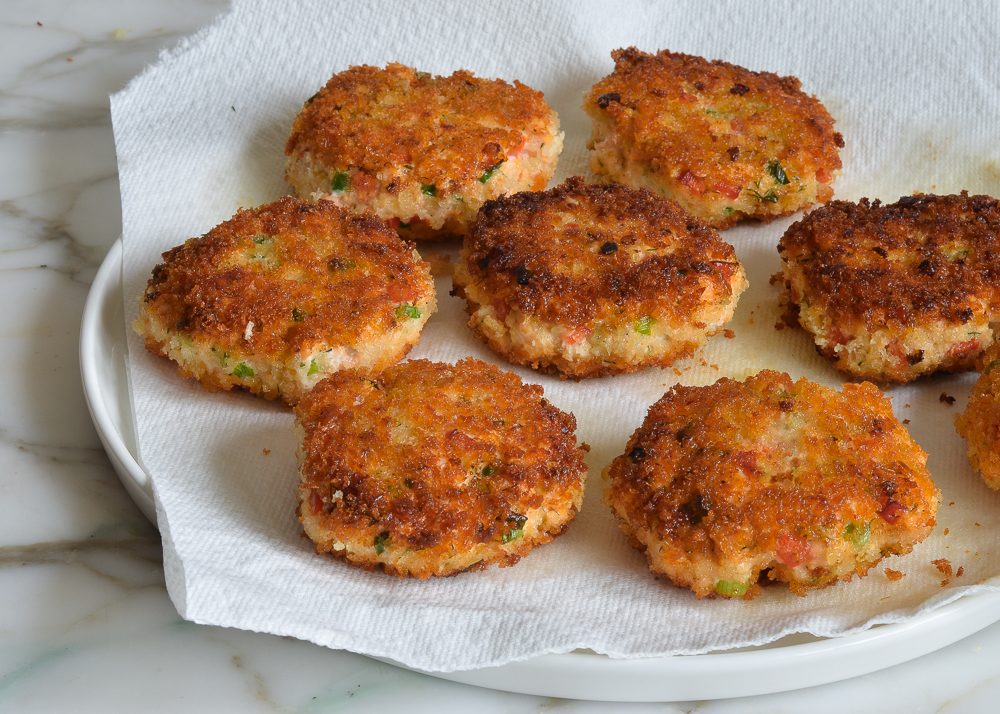
Serve warm with tartar sauce and enjoy!

Video Tutorial
You May Also Like
Salmon Cakes
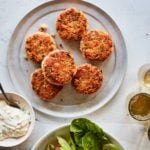
Made with fresh salmon and seasoned with Old Bay, these salmon cakes are a delicious upgrade from the canned version you might remember—and they can be made entirely ahead of time.
Ingredients
For the Salmon Cakes
- ¼ cup mayonnaise
- 1 tablespoon fresh lemon juice, from 1 lemon
- 1 teaspoon Dijon mustard
- 1 teaspoon Old Bay seasoning
- ¾ teaspoon salt
- ¼ teaspoon freshly ground black pepper
- 1¼ lb skinless salmon fillet, finely diced into ¼-inch pieces (see note)
- 1¼ cups panko bread crumbs, divided
- ¼ cup thinly sliced scallions, from 3 to 4 scallions, light and dark green parts
- ⅓ cup finely diced celery, from 2 stalks
- 2 tablespoons finely chopped fresh dill
- ½ cup vegetable oil
- Salad greens with vinaigrette, tartar sauce and/or lemon wedges, for serving (see note)
Instructions
- In a large bowl, whisk together the mayonnaise, lemon juice, mustard, Old Bay, salt, and pepper. Add the diced salmon, ¼ cup of the panko, the scallions, the celery, and the dill. Gently mix until uniformly combined.
- Place the remaining 1 cup of panko in a shallow dish or pie plate. Using a ⅓-cup measure, scoop the salmon mixture and form into a compact cake about 1 inch high. Place the salmon cake into the panko and gently coat it all over in crumbs. Repeat with the remaining mixture to form about 9 cakes. (At this point, you can refrigerate the salmon cakes for a few hours until ready to cook, if you'd like.)
- Heat the oil in a medium nonstick skillet over medium-high heat until shimmering. Place half of the salmon cakes in the skillet and cook without moving until golden brown, about 2 minutes. Carefully flip the cakes and cook until second side is golden brown, about 2 minutes more. Reduce the heat to medium if the cakes are browning too quickly. Transfer cakes to paper towel–lined plate to drain. Repeat with the remaining cakes (no need to change the oil). Serve warm.
- Note: If buying a skin-on salmon fillet, purchase 1⅓ pounds of fish to yield 1¼ pounds of fish after skinning.
- Make-Ahead: The salmon cakes can be fully cooked and refrigerated up to several hours ahead of time. To reheat: preheat the oven to 350°F and line a baking sheet with aluminum foil. Place the salmon cakes in the oven and cook until crisp on the exterior and warm throughout, 10 to 15 minutes. The cakes may also be frozen for up to 3 months; defrost in the refrigerator before reheating.
- Freezer-Friendly Instructions: The cooked salmon cakes can be frozen for up to 3 months. Once cool, lay them out on one (or more) foil-lined baking sheet(s) and cover them loosely with plastic wrap. Freeze the patties in a single layer for about an hour, then remove them from the freezer. Wrap the cakes individually in plastic wrap and then put them together in a freezer bag or airtight container. Before serving, defrost in the refrigerator before reheating.
Nutrition Information
Powered by ![]()
- Serving size: 1 salmon cake
- Calories: 280
- Fat: 22 g
- Saturated fat: 3 g
- Carbohydrates: 6 g
- Sugar: 0 g
- Fiber: 0 g
- Protein: 14 g
- Sodium: 222 mg
- Cholesterol: 37 mg
This website is written and produced for informational purposes only. I am not a certified nutritionist and the nutritional data on this site has not been evaluated or approved by a nutritionist or the Food and Drug Administration. Nutritional information is offered as a courtesy and should not be construed as a guarantee. The data is calculated through an online nutritional calculator, Edamam.com. Although I do my best to provide accurate nutritional information, these figures should be considered estimates only. Varying factors such as product types or brands purchased, natural fluctuations in fresh produce, and the way ingredients are processed change the effective nutritional information in any given recipe. Furthermore, different online calculators provide different results depending on their own nutrition fact sources and algorithms. To obtain the most accurate nutritional information in a given recipe, you should calculate the nutritional information with the actual ingredients used in your recipe, using your preferred nutrition calculator.
See more recipes:
Comments
Add a Comment Cancel reply
This site uses Akismet to reduce spam. Learn how your comment data is processed.
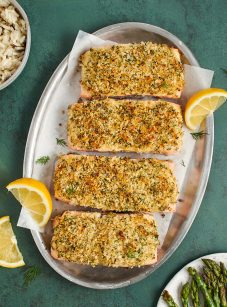
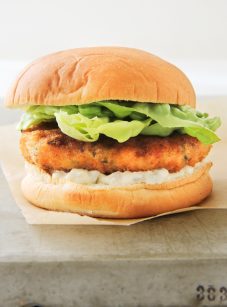
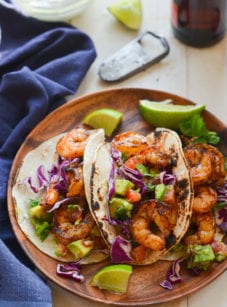
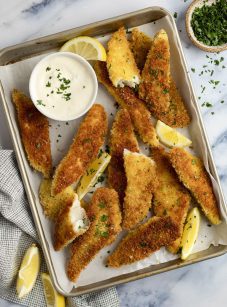
I found your recipe a couple years ago and have been making them ever since! They are truly delicious and always well received. I omit the Old Bay as I’m not a fan, but all other ingredients blend perfectly. I also found that refrigerating the mix prior to cooking kept them from falling apart. Thanks for sharing your recipe!
I love these and the homemade tartar sauce butI find that fall apart easily when I cook them. What am I doing wrong?
Hi Sue, I’m sorry to hear they fall apart when you cook them. Next time, I’d try cutting the salmon into slightly smaller pieces. Also, try refrigerating them for an hour before cooking.
This might seem like a stupid question, but is the salmon cooked before it is used or are you talking about using raw salmon?
Not stupid at all – the salmon should be raw. Enjoy!